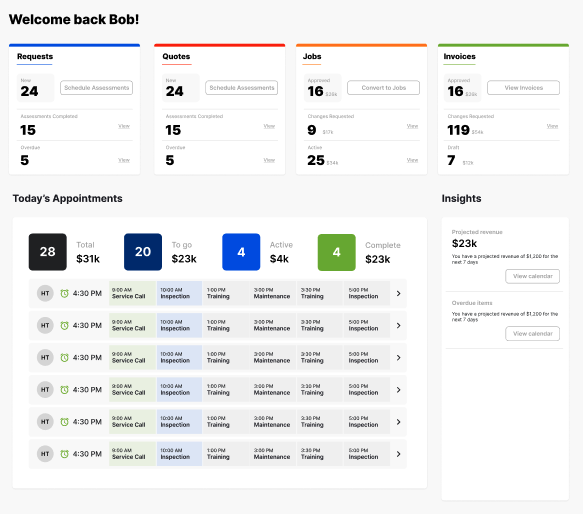The Importance of Punctuality and Attendance in Field Service
Punctuality exemplifies professionalism and a commitment to excellence. It signifies readiness and preparedness. A technician working in the field who consistently arrives late for appointments fails to inspire confidence in customers and leaves them feeling undervalued.
Duration:
Published on March 4, 2024
Being punctual for work is an indispensable quality sought after by numerous employers and clients, particularly in field service industries. Timeliness not only enhances your professionalism but also reduces stress and yields various other advantages. Hence, showing up to work on time serves as a significant means to enhance your value as an employee.
What is punctuality?
Punctuality refers to the capacity to be prompt, attending appointments punctually, and submitting assignments within set deadlines. In a professional setting, punctuality entails proactive planning and organizing to fulfill obligations within a strict time frame. This involves coordinating commutes to arrive at work punctually, adhering to scheduled meetings, and planning tasks to meet the timing requirements set by managers or clients.
What is attendance?
Attendance pertains to the regularity and reliability of your presence at scheduled events or commitments, such as work or school. Workplace attendance entails arriving for scheduled shifts and remaining present for the entirety of those shifts. Additionally, effective attendance management involves open communication with managers and colleagues regarding any planned absences, allowing for adjustments to schedules and responsibilities as needed.
What is the importance of punctuality and attendance?
The importance of punctuality and attendance in the workplace lies in their fundamental role in upholding productivity. Colleagues rely on each other's punctuality to collaborate effectively on projects, provide timely feedback, and meet client expectations. Here are some key reasons why punctuality and attendance are vital:
- Building a culture of trust: Consistent punctuality and attendance among team members foster a sense of trust. This trust enables individuals to rely on one another for assistance with tasks and ensures timely submission of project components.
- Enhancing efficiency: Punctual behavior contributes to improved efficiency. By arriving on time for meetings and work commitments, individuals can commence their responsibilities promptly, minimizing unnecessary delays.
- Fostering a positive reputation: Maintaining punctuality and attending work reliably allows for increased productivity and consistent communication with clients. This dedication leads to enhanced relationships with customers and cultivates a reputation for delivering quality work consistently.
Overall, punctuality and attendance play crucial roles in promoting a productive and reputable work environment, facilitating effective collaboration, and ensuring client satisfaction.
10 reasons emphasizing the importance of punctuality in the workplace
Ensuring punctuality at work is a crucial aspect of being a reliable employee. By setting an alarm to wake up on time, planning your commute in advance, and making necessary preparations, you can help guarantee your timely arrival. Here are 12 reasons highlighting the significance of punctuality in the workplace:
Being punctual for work allows you to exhibit professionalism, encompassing behavioral standards, workplace values, and other essential characteristics. Arriving early or on time underscores your reliability and trustworthiness as an employee. Consistent punctuality serves to showcase your adherence to professional standards, thereby enhancing your value within the organization and facilitating career advancement.
Consistently arriving on time for work enables you and your team to meet critical deadlines effectively. By punctually starting your day, you create ample opportunities to address tasks early, thereby freeing up time for essential projects. This proactive approach aids in fulfilling deadlines without the pressure of rushing through assignments.
Another advantage of punctuality is the reduction of stress. Tardiness often leads to heightened stress levels, as it may result in rushed tasks and projects. Conversely, arriving early or on time allows you to complete assignments at a comfortable pace, alleviating the pressure of time constraints. Additionally, having extra time in the morning provides flexibility to handle unforeseen challenges such as traffic delays, further diminishing stress levels.
Timely arrival for work contributes to improved work relationships and teamwork. Punctuality demonstrates respect for others' time, enhancing their perception of you. Moreover, being on time for crucial meetings signifies your commitment to the team's welfare, fostering team morale and strengthening relationships.
Maintaining punctuality ensures sustained productivity in the workplace. By arriving early or on time, you can remain focused on your tasks, avoiding disruptions that tardiness may cause to your coworkers. This commitment to punctuality supports a consistent workflow for everyone.
Consistent punctuality also provides an opportunity to exhibit leadership qualities. Timely attendance sets a positive example for your colleagues, showcasing your responsibility, dedication, and ambition—qualities inherent in effective leaders. Displaying leadership attributes can lead to recognition, promotions, and overall career advancement.
Consistently being on time for work contributes to a positive public perception of both yourself and your employer. Individuals who are punctual are often perceived as responsible, reliable, and professional employees, thereby enhancing your personal reputation as well as the reputation of your company.
Punctuality serves as a reflection of effective time-management skills. By consistently arriving on time for work, you demonstrate your ability to plan and schedule your mornings efficiently. Mastering time-management skills is crucial for career advancement and enhances your overall job performance.
Being punctual often translates to starting your workday earlier, facilitating increased productivity and reduced distractions. Initiating tasks promptly can lead to accomplishing more within the workday, contributing to both personal and organizational success.
Punctuality enables you to adhere to your own schedule, ensuring completion of all tasks within designated work hours. Tardiness poses the risk of missing meetings and falling behind on important assignments, potentially necessitating work outside regular hours. Timely arrival allows you to stay on or ahead of schedule, preserving leisure time and promoting a healthy work-life balance.
